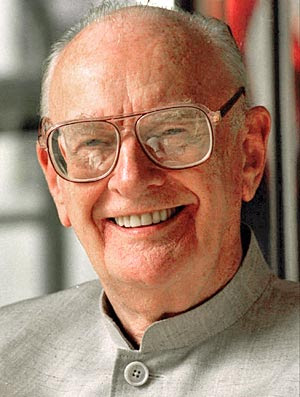
One of Science Fiction's True Masters Passes On
Sir Arthur C. Clarke has died at 90.
The world is poorer today than yesterday.
In a world where millions are born and die daily, as wars and poverty rage on, I morn this artist who along with Heinlein and Asimov, wrote Science Fiction into a golden first age and beyond.
Sir Arthur C. Clarke. photo Fiona Hanson/AP.
Los Angeles TimesMy personal favorite, is his 1953 short story (also the title of a short story collection), The Nine Billion Names of God.
Among his best-known science-fiction novels are "Childhood's End," "Rendezvous With Rama," "Imperial Earth" and, most famously, "2001: A Space Odyssey."
"It's better to be recognized for one thing, especially something of which I'm quite proud, than not to be recognized at all," Clarke told The Times in 1982.
Although he never intended to write a sequel to "2001," he wrote three: "2010: Odyssey Two," "2061: Odyssey Three" and "3001: The Final Odyssey."
Clarke, who was named a Grand Master by the Science Fiction and Fantasy Writers of America in 1986, won innumerable international awards for his fiction and scientific writing.
"Rendezvous with Rama," his 1973 novel about a space probe sent to explore an enormous celestial object speeding through the solar system that turns out to be a mysterious alien spacecraft, was one of Clarke's greatest critical successes. It won the prestigious Nebula, Hugo and John W. Campbell awards for best novel, as well as the British Science Fiction Associate Award, the Locus Award and the Jupiter Award.
Clarke was not only known as one of the 20th century's most prolific science-fiction writers but one of the best-grounded scientifically, with a remarkable record of foreseeing future technologies.
Indeed, he was known as "the godfather of the telecommunications satellite."
A radar pioneer in the Royal Air Force during World War II, Clarke wrote a 1945 article in Wireless World magazine in which he outlined a worldwide communications network based on fixed satellites orbiting Earth at an altitude of 22,300 miles -- an orbital area now often referred to as the Clarke Orbit.
Clarke's seminal article, for which he received $40, was published two decades before Syncom II became the world's first communications satellite put into geosynchronous orbit in 1963.
For pioneering the concept of communications satellites, Clarke received a number of honors, including the 1982 Marconi International Fellowship and the Charles A. Lindbergh Award.
Deemed a scientific visionary, Clarke also foretold an array of technological notions in his works such as space stations, moon landings using a mother ship and a landing pod, cellular phones and the Internet.
"Nobody has done more in the way of enlightened prediction," science fiction author Isaac Asimov once wrote.
Clarke died in his beloved Sri Lanka.
Tat Tvam Asi.





|